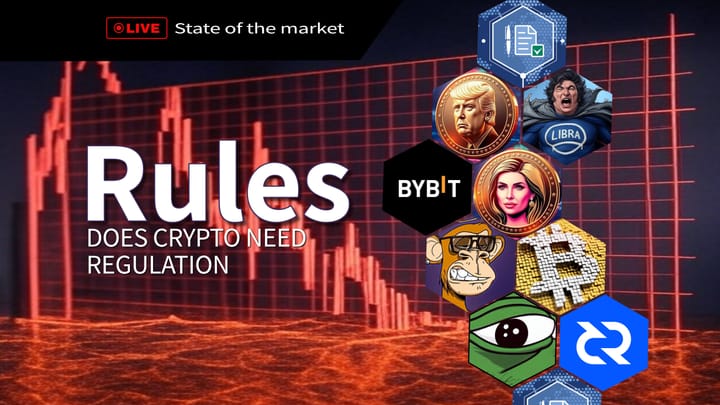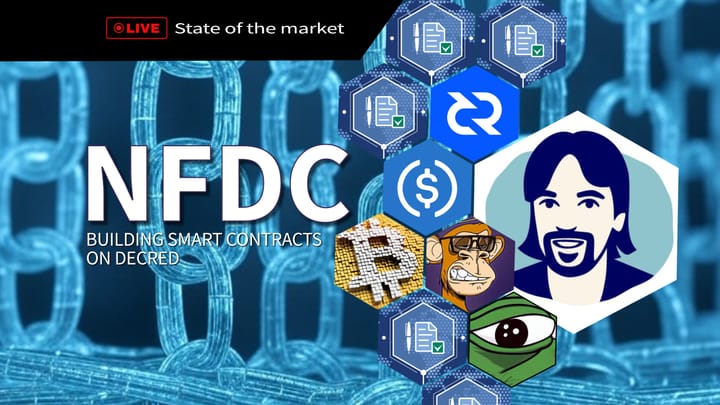The roadmap toward a greener blockchain future necessitates a collaborative endeavour spanning developers, users, miners and stakeholders.
Introduction
The world of cryptocurrency has ignited a seismic shift in the way we perceive financial systems. Cryptocurrencies promise decentralized transactions, financial inclusivity, and a paradigm shift away from traditional banking structures. However, as the cryptocurrency landscape expands its horizons, it brings with it a series of pressing environmental concerns. This comprehensive article delves deep into the intricate interplay between cryptocurrency mining, blockchain technology, and their environmental consequences. It explores the relentless pursuit of sustainable solutions and casts a spotlight on Decred—a groundbreaking cryptocurrency platform—with its pioneering approach toward creating a more ecologically conscious blockchain ecosystem.
The Environmental Quandary in Cryptocurrency Mining
Cryptocurrency mining, particularly the energy-intensive Proof of Work (PoW) mechanism, has ignited a fierce debate about its environmental implications. The process demands an extraordinary amount of computational power to solve intricate mathematical puzzles, all while ensuring the security of the network. However, the price paid for this security is a substantial carbon footprint. Major cryptocurrencies like Bitcoin have drawn comparisons to entire countries in terms of electricity consumption. This formidable energy expenditure not only raises alarms about carbon emissions but also triggers questions about the long-term sustainability of such energy-intensive operations.
For further reading please see below references:

The Imperative for Sustainable Solutions
Recognizing the urgency of these environmental concerns, the cryptocurrency community is actively exploring alternative consensus mechanisms that mitigate the energy footprint of blockchain networks. Among these contenders, the Proof of Stake (PoS) mechanism stands tall. Decred, a cryptocurrency at the forefront of innovation, has taken this alternative to heart. In stark contrast to PoW, where miners compete to validate transactions, PoS confers this validation right to participants who demonstrate ownership of a specific cryptocurrency amount. This pivotal shift substantially curbs energy consumption while preserving the integrity of the blockchain—a potential solution to the energy dilemma.
Decred employs a unique hybrid consensus mechanism that combines Proof of Work (PoW) mining with Proof of Stake (PoS) participation, ensuring a robust and secure network. In the PoW phase, miners compete to solve complex mathematical puzzles, securing the blockchain and validating transactions. PoW and PoS combine to act as a two-factor authentication mechanism to heighten Decred's overall security. Rather than solely relying on the brute force of hash power, the project also gets a security boost from PoS validating the miners work. However, what sets Decred apart is its PoS component. Token holders can "stake" their DCR (Decred's native cryptocurrency) by locking it into the network for a specific period. These stakeholders gain the right to participate in important network decisions and validate transactions, reducing their reliance on energy-intensive PoW mining. This hybrid system fosters decentralization and active community involvement, making Decred a pioneering example of a cryptocurrency project that seeks to balance security, energy efficiency, and user engagement.
Decred has recently used this staking and voting power to make a consensus change. Decred mining now uses the BLAKE3 hashing function. Note that BLAKE3 is only used in the Proof-of-Work hash while the block hash still uses BLAKE-256 14 rounds. See DCP-0011 for more details.
For more details on BLAKE3:

Decred: A Trailblazing Model of Sustainability
Decred's commitment to sustainability finds its embodiment in its ingenious hybrid PoW/PoS consensus mechanism. PoW is harnessed to secure the network, while PoS encourages token holders to actively participate in governance decisions. This harmonious blend exemplifies a remarkable effort to harmonize technological innovation with environmental consciousness. In an era where energy-intensive mining practices are under intense scrutiny, Decred's approach radiates as a beacon of potential, showcasing that the blockchain landscape can indeed be traversed sustainably. After the last consensus change the Decred hash power came down from 500phs at the height to an average of 50phs. This should also reduce further with the move to Common CPU / GPU mining.
Personal Reflection: Lessons Learned and Perspectives Gained
Navigating the convoluted terrain of cryptocurrencies, I've encountered a profound learning experience—one replete with both enlightenment and caution. As blockchain networks burgeoned exponentially, I couldn't overlook the colossal energy footprint perpetuated by traditional PoW mining methods. The tantalizing promise of cryptocurrencies as vehicles of transformation has always coexisted with a looming concern about their environmental impact. However, amidst these concerns, beacons of hope have emerged. Projects like Decred have unflinchingly embraced the pursuit of sustainable alternatives. This personal journey underscores the gravity of aligning technological advancements with environmental stewardship.
Harmonizing Innovation with Ecological Responsibility
The cryptocurrency realm teeters on the cusp of a pivotal moment where innovation's tide must be balanced with the environmental responsibility incumbent upon us. While the exhilarating promise of blockchain-driven financial revolution sweeps us into its vortex, the attendant environmental toll cannot be disregarded. Decred's tenacious adherence to a sustainable course testifies to the possibility of harmonizing cutting-edge innovation with ecological mindfulness. This approach should resonate as an exemplar, echoing through the vast corridors of the cryptocurrency domain, urging industry-wide adoption of practices that honor both innovation and the planet.
Collaborative Endeavors for a Greener Future
The roadmap toward a greener blockchain future necessitates a collaborative endeavour spanning developers, users, and stakeholders. Decred's practical implementation of the PoS mechanism isn't a mere theoretical abstraction; it stands as a tangible, operational solution to the pressing problem of energy-intensive mining. The embracement of such sustainable consensus mechanisms in unison with support for projects championing environmentally conscious practices offers a potential avenue to curtail the ecological impact of blockchain technology.

Embracing Proof of Stake: A Pathway to Environmental Harmony
The shift towards Proof of Stake (PoS) consensus mechanisms within the cryptocurrency landscape holds the promise of a greener, more sustainable future. As more projects consider making the transition from energy-intensive Proof of Work (PoW) systems, the potential for positive environmental impact becomes increasingly evident. PoS not only addresses the energy inefficiencies that have been a hallmark of PoW, but it also presents a novel opportunity to align technological innovation with ecological responsibility.
One of the most striking benefits of PoS is its significantly reduced energy consumption. Traditional PoW mechanisms require miners to solve complex mathematical problems, consuming vast amounts of computational power and electricity. In contrast, PoS validates transactions by assigning the role to participants who hold a stake in the cryptocurrency. This approach dramatically cuts down on energy use, as there is no need for resource-intensive mining operations. As more projects shift to PoS, the collective energy footprint of the cryptocurrency industry could be substantially reduced, alleviating the strain on energy resources and contributing to a more sustainable energy future.
Decred employs a unique hybrid consensus mechanism that combines Proof of Work (PoW) mining with Proof of Stake (PoS) participation, ensuring a robust and secure network. Proof of Work (PoW) remains a crucial component in many cryptocurrency networks, including Decred, primarily due to its unparalleled ability to safeguard against malicious attacks. PoW's computational complexity makes it highly resistant to attacks like double-spending, where an attacker attempts to spend the same cryptocurrency twice. Miners must invest substantial computational power and resources to secure the network, which acts as a powerful deterrent against would-be attackers. This resource-intensive nature ensures that attackers face significant costs and obstacles when attempting to manipulate the blockchain. Consequently, PoW continues to be a valuable element in maintaining the security and integrity of cryptocurrency networks, reinforcing trust among users and stakeholders.

Ethereum: Advancing Sustainability in Smart Contracts
Ethereum, one of the most prominent blockchain platforms, has recognized the environmental challenges associated with its Proof of Work (PoW) consensus mechanism and is actively working towards a more sustainable future. Ethereum has transitioned from PoW to Proof of Stake (PoS) through its Ethereum 2.0 upgrade. The upgrade dramatically reduced Ethereum's energy consumption while maintaining the security and efficiency of its blockchain. Ethereum's commitment to sustainability not only addresses environmental concerns but also aligns with the broader industry shift towards greener consensus mechanisms. Ethereum's journey toward PoS represents a significant step forward in demonstrating that blockchain innovation and ecological responsibility can coexist, setting an example for the entire blockchain community to follow.
Zcash: Pioneering Sustainable Privacy Solutions on the Blockchain
Zcash is an interesting case in the context of the journey toward sustainable blockchain solutions. Zcash, like Bitcoin, initially employed a Proof of Work (PoW) consensus mechanism, which consumes substantial energy. However, Zcash implemented the "zk-SNARKs" (Zero-Knowledge Succinct Non-Interactive Argument of Knowledge) protocol, which allows for enhanced privacy by shielding transaction details while also reducing the computational requirements for mining. This innovation represents a step towards greater energy efficiency in blockchain networks, as it demonstrates that privacy and sustainability can coexist. By focusing on privacy-enhancing technologies that don't rely on energy-intensive processes, Zcash highlights the importance of exploring alternative consensus mechanisms and privacy solutions in the pursuit of environmentally conscious blockchain ecosystems.
Conclusion: Steering the Course of Responsible Revolution
The meteoric rise of cryptocurrencies promises to redefine the contours of finance and beyond. However, this revolution must be orchestrated with the symphony of environmental mindfulness. The environmental concerns tethered to PoW mining are profound and warrant meticulous consideration. Decred's unwavering dedication to sustainable practices serves as a guiding star, illuminating the path of how innovation and ecological responsibility can coexist in perfect harmony. As the cryptocurrency panorama evolves, the seamless integration of sustainable solutions into its fabric becomes non-negotiable. Decred's resolute commitment to sustainability should act as a lodestar, inspiring fellow players in the industry to navigate the labyrinth of blockchain technology while nurturing our planet. In striking this delicate equilibrium, the cryptocurrency community wields the power to not only revolutionize finance but also to etch an indelible positive imprint on the Earth itself.










Comments ()